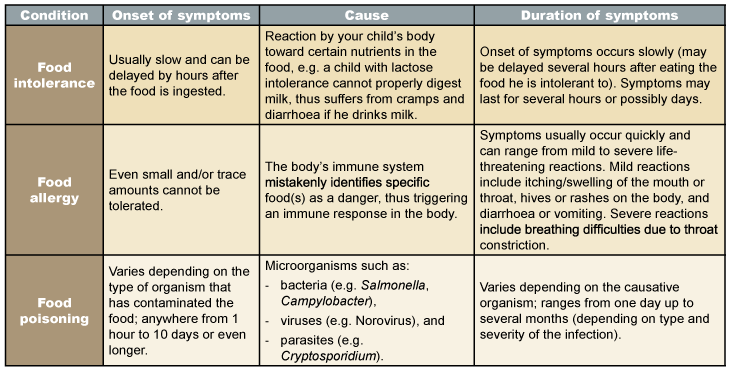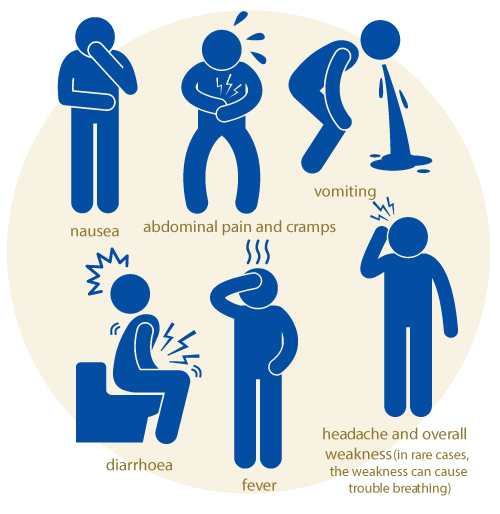Food poisoning is what happens when your child ingests any food or drink that has been contaminated with bacteria or viruses. The damage is usually caused by toxins released by these microorganisms once they enter your child’s body, which can cause vomiting or diarrhoea.
In most cases, food poisoning clears up on its own – however, in the event of a more severe case, you should know what to do for your child. The biggest danger of food poisoning is often dehydration, as the victim will lose a lot of fluids due to vomiting and/or diarrhoea.
Differentiating between intolerance, allergy, and poisoning
Your child may be experiencing vomiting or diarrhoea, typical symptoms of food poisoning, but is your child having just food poisoning or something else? It can be quite difficult to tell them apart.
In general, food intolerance is more common than food allergy. Both are different from food poisoning as they are related to your child’s body reacting to a particular food type to which he is either intolerant or allergic to. Here are some clues to help differentiate between the three conditions:

Do note that in the case of food intolerance or allergy, the foods in question are safe for consumption by anyone else who does not have the same intolerance or allergy to them, whereas in the case of food poisoning, the food in question has been contaminated and should not be consumed at all.
Recognising food poisoning
The signs and symptoms of food poisoning depend on the type of microorganism that has infected your child. You may have a child who starts to feel sick within a short time after consuming contaminated foods or drinks. On the other hand, he may not show any symptoms until several days later. While most cases of food poisoning clear up within the span of several days, make sure you stay alert to your child’s physical condition and ensure that he is properly hydrated.
The typical signs of food poisoning include:

Less common signs and symptoms of food poisoning include dizziness, blurry vision, or tingling of the arms.
Treating food poisoning
In mild cases of food poisoning, it is often enough to ensure that your child receives sufficient fluids to prevent dehydration. While a mild case of food poisoning does not require medical attention, you should stay alert. Dehydration is the most common complication of food poisoning. As long as your child remains well hydrated and his condition improves, a trip to the doctor is not necessary. Do read the article “The Dangers of Dehydration in Children” on page 39 to learn more.
Ensure he gets plenty of rest and avoids solid foods until his diarrhoea or vomiting stops. Only then can you provide him with small portions of food that are bland with a low-fat and low-oil content, to prevent upsetting his stomach again.
However, if his condition deteriorates or does not improve over time, the best course of action is to take him to see his doctor or paediatrician. The more severe cases may require a round of antibiotics for treatment and if he becomes severely dehydrated, he may need to receive intravenous (IV) fluids.
Immediate attention needed
In the event that your child is suffering from a severe bout of food poisoning, he may exhibit some of the symptoms listed below:
- multiple bouts of vomiting – if he vomits several times within the last 12 hours
- diarrhoea accompanied with a high fever (above 38.3°C)
- severe abdominal pain or cramps which remain unrelieved by bowel movements
- blood in his faeces (regardless whether it is regular poop or if it is diarrhoea), this can show up as black, maroon, or bright red
- blood in his vomit
- his heart beat is skipping, racing, or pounding
These are all signs that indicate you should take him to see his doctor or paediatrician immediately.






Comments